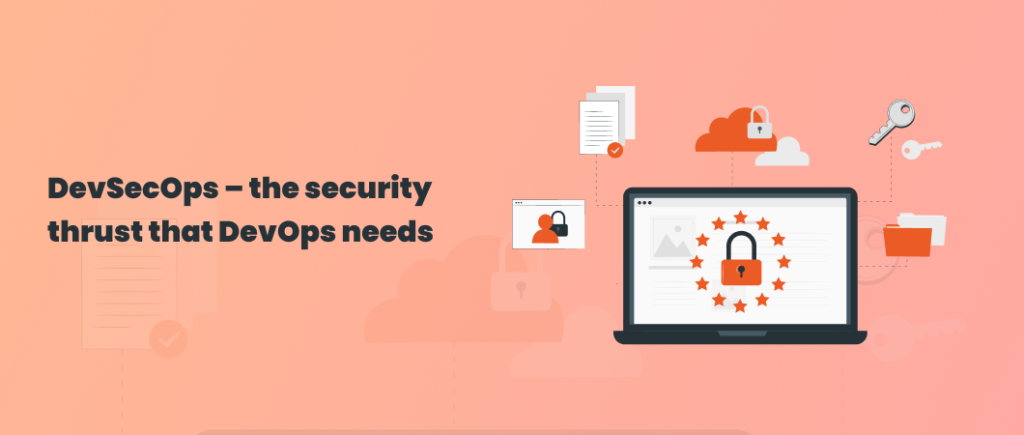Last updated on January 23rd, 2023
Previously regarded as an afterthought, application security is a critical element of any application development process. As more applications move to the cloud, there are growing concerns about external threats and breaches.
Today, “security” as a term is not just about the supporting infrastructure or the network. There is increasing emphasis on building security within the application itself.
Application security is the domain for following the best practices during application development. It aims to protect the application code and data from a breach or compromise. Effectively, it minimizes the probability of hackers gaining unauthorized access to applications, data, and the underlying system.
Even with all its advantages, product companies find it challenging to secure their applications in a constantly changing IT environment. Here is a look at the leading challenges for building secure applications and how to overcome them by adopting DevSecOps.
Challenges to Building Secure Applications
Software companies continue to follow a “reactive” approach to application security. Instead, a “proactive” approach is necessary to prevent a security issue from becoming a major problem.
Here are five challenges facing product companies that hinder them from building secure products:
1. Multiple Platforms
In the modern app development environment, applications are typically spread across multiple platforms. This includes the web, mobile platforms, and desktops, thus increasing the surface attack for external threats. And companies often release new applications without following the necessary security protocols. Additionally, each platform adopts its security framework, which is challenging for security professionals to learn and grasp.
2. The Shift to the DevOps Model
By integrating both Development and Operations, product companies are leveraging benefits like faster product releases and high-quality apps. To implement DevOps, organizations are migrating to the IaaS model, which is much easier to configure. Developers are also creating new infrastructure code that dynamically creates server instances for automatic code deployment.
However, with the shift to DevOps, security professionals also face challenges like adapting to a continuous development cycle and changing configurations.
3. Talent Shortage
With more new applications, there is a serious shortage of skilled professionals required to secure these apps. App development trends like containers and microservices are also outpacing the time that security experts need to master new techniques.
Additionally, product companies are working in multi-cloud environments, each of which has specific security requirements. In this age, application security is a specialized field where formal education is not sufficient to train professionals. Adding to the challenge, experienced app security professionals are costly to hire and retain.
To meet the talent shortage, companies need to partner with professional security consultants.
Also Read: The Security Challenge In DevOps And The Rise Of DevSecOps
4. Specialized Skills
Despite growing security awareness, the reality is that DevOps team members cannot address security concerns within applications. They do not train for this function. Be it developers or operational teams, app security is not their focus area. Effective application security requires people with specialized skills who can work in tandem with the DevOps team.
The best solution to this challenge is to hire security specialists either internally or externally (or a mix of both).
5. New App Build Methods
Traditional applications were monolithic in design, where developers wrote build code for the main server. Now, product companies are shifting from monolithic to microservices, which contain smaller and multiple units that are packaged together. Modern apps are also a collection of cloud-native containers (using APIs).
Unfavorably, cybercriminals can exploit the microservices architecture (with any security-related vulnerability).
How can DevSecOps help organizations overcome these app security challenges? Let’s discuss that in the following section.
What Is DevSecOps and How Can It Secure Applications?
DevSecOps is a collaboration of Development and Operations teams (or DevOps) to integrate security in their application development. As the latest practice, DevSecOps incorporates application security from the early phases of software development.
How is DevSecOps different from DevOps? DevOps essentially accelerates product delivery. DevSecOps compliments the DevOps approach by delivering secure apps faster to the customer. At its core, DevSecOps integrates security into every stage of SDLC, from development to the build and production.
In the DevSecOps environment, security is not the sole responsibility of the IT security team. Instead, it is the shared responsibility of every stakeholder including development, build, and operations teams.
Through the fusion of DevOps and application security, DevSecOps can drive transformation by:
- Leveraging the “Shift-left” approach to fix security-related issues early in the development phase.
- Integrating security-related best practices in the development workflow and CI/CD process.
- Developing a “shared” organizational culture that underlines the importance of app security.
- Embracing cloud-native features with security to streamline the app development process.
- Implementing Agile security that begins with a minimum viable security for delivered applications followed by continuous and incremental improvements.
- Adopting a “programmatic” approach to app security through continuous improvements.
The Way Forward with DevSecOps
As applications become larger and more complex, traditional security practices can no longer safeguard them from external threats. DevSecOps is an efficient framework that ensures faster application releases along with an improved security framework. With its “Shift-left” approach, DevSecOps uses a variety of app security testing tools that can work at various stages of the CI/CD pipeline.
As a product development company, Forgeahead understands the importance of delivering secure products to the market. For us, DevSecOps is all about securing the product development process. With our DevOps expertise, we can help in embedding app security seamlessly into product development.
Get a free estimate for your next application development project from us. Talk to our consultants today.



